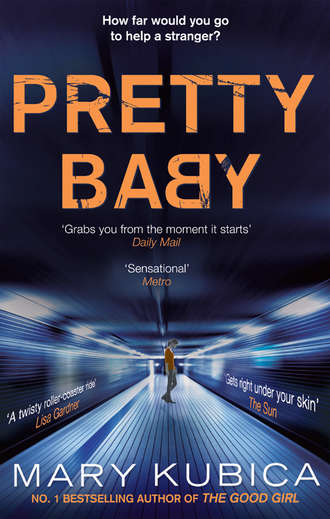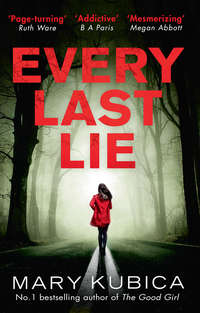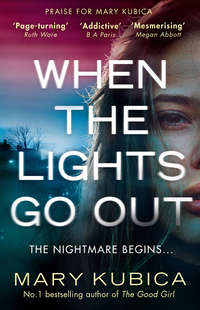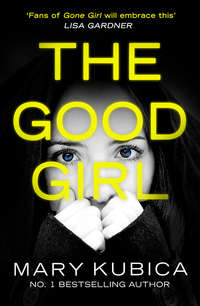
Полная версия
Pretty Baby
“Wait,” I say, before she slips away. Without thinking, I place a hand on the nylon coat and stop her before she goes. The nylon feels strange to my touch, foreign. When the frosty blue eyes turn to me, I withdraw the hand in haste, and beg, “Please. Wait. Just one second,” as I unearth a business card from my bag. A simple black business card with my name and phone numbers—cell and work—in white, in an easy-to-read Comic Sans font. I force it into her hand. “In case—” I begin, but a waiter rushes past in haste, a tray full of food perched on a palm above his head, and sing-songs, “Excuse me, ladies,” and the girl retreats from him, retreats from me and withers slowly away, backward, like buttercup roses in a cylinder vase, shriveling up and fading away.
And there I stand, all alone, in the middle of Stella’s, thinking, Please. Wait. Though by now the girl has vanished from the diner and the redheaded waitress, apathetic to my distress, passes by and hands me the check.
* * *
I take the long way home, anesthetized to the cold, to the fine mist in the air. I go the long way, stopping by the used bookstore on Lincoln to pick up a copy of Anne of Green Gables.
I pay two dollars for the book because there are pages falling out, random, forgotten treasures tucked inside the aging pages: a bookmark with tassels, an old photograph of a little girl in white knee highs beside her grandfather in blue plaid pants. There’s an inscription in the book, and a date: To Mom 1989.
I find my neighbor Graham in the hallway on my way upstairs, about to drop an empty bottle of wine down the garbage chute. “That’s recyclable,” I remind him, hearing a pestering quality to my voice that drives Chris mad.
But Graham just laughs. He’s left his condo door wide-open, a blonde beauty queen on the sofa with a fresh glass of Chablis. We exchange a look, and I force a smile, one that she doesn’t return.
“Caught by the recycle police, again,” he says, withdrawing the bottle from the chute. There are recycle bins by the freight entrance of our building, a long walk for someone who doesn’t think much of the environment. But I do. I stop myself before reminding Graham that it takes some one million years for a glass bottle to decompose.
There’s an overwhelming need to tell someone about my night at Stella’s, knowing that Chris won’t do. Not even Jennifer will do—she is much too logical, too left-brained for this kind of insanity. I need someone who’s ruled by the right brain like me, someone driven by feelings and emotions, by their imagination and beliefs, someone inspired by fantasy.
Someone like Graham.
But from the open condo door, I hear the sound of acoustic guitar on his stereo, the beauty queen beckoning him by name. He tucks the empty wine bottle beneath an arm and tells me he has to go. “Of course,” I say, and watch as he closes the door behind himself and I find myself staring at a square boxwood wreath, listening to a squeal from his date.
Inside my own home, I forget all about my movie and tuck myself into bed with Anne of Green Gables. When Chris finally returns home from his trip, I hide the book quickly underneath the bed, behind a flounced charcoal bed skirt where only cats and dust bunnies dwell, and pretend to be asleep.
He crawls into bed beside me and kisses me long and slow, though his lips are laced with the image of Cassidy Knudsen.
WILLOW
My momma was the most beautiful lady in the world. Long black threads of hair, a thin face with high cheekbones, perfectly arched eyebrows and the bluest eyes I’d ever seen. I love you like a squirrel loves nuts, she’d say to me, or I love you like a mouse loves cheese. We’d spend half a day trying to think of the silliest ones we could: I love you like a fat boy loves cake. And we’d die laughing. It was our thing.
We lived in a rural Nebraska home, in a tiny little unincorporated town just outside of Ogallala. Momma and Daddy, Lily and me. Ogallala came long before Omaha, just like Momma and Daddy came long before Joseph and Miriam. It was another whole world to be exact, another whole me.
Momma used to tell me all the time about the day she and Daddy got married. She said that by the time they said “I do,” she was already pregnant with me, which didn’t matter none to her or Daddy, but her own momma and daddy didn’t like it one bit. Turned out they didn’t like Daddy much, either, and so one day, when Momma was nineteen years old, she and Daddy drove out to a chapel in Des Moines, and they got hitched. Momma told me about it, about their wedding in a cozy little church on the side of the road, as we sat on the front step of our tiny prefabricated home, painting our toes candy-apple red while Lily slept the afternoon away. I was eight years old. Momma told me about the chapel, about her walking down the aisle in a strapless, tea-length vintage wedding dress the color of snow; she told me about her veil, a birdcage veil she called it, and I imagined canaries perched on the top of her head. She told me about the man who did their wedding, some man named Reverend Love, and even at that age, at eight years old, I had a hard time believing that was his real name. Reverend Love. I remember the way Momma said his name, that very day we sat on the front step of our prefab home, staring down the boring old street at some boys playing kickball on their lawn, the way she elongated the word love until we both about died laughing.
But she said that Daddy was handsome as all get out, dressed up in a shirt and tie, a sport coat he’d borrowed from a friend. I tried hard to imagine that, ’cause I didn’t think I’d ever seen my daddy in a shirt and tie before in my whole entire life. There were no photos from their wedding, ’cause Momma and Daddy didn’t own a camera back then, but they had a piece of paper that said they were married, and that was even more important to them than some picture. Momma showed it to me, that paper. Certificate of Marriage, it said, and there, at the bottom, the words Reverend Love.
And then, some six months later, I was born. Momma told me about that day, the day I arrived. She told me how I took my sweet time coming out of her, how I was in no rush. She told me how Daddy held on tight to me, there at the hospital, as if he thought I was gonna break. I didn’t meet my grandparents when I was born, not then, not ever. Momma’s momma and daddy didn’t want a thing to do with us, and Daddy’s, well, Daddy’s were dead. We visited them every now and then, over at the cemetery on Fifth Street, leaving browning dandelions beside the headstones that read Ernest and Evelyn Dalloway.
My momma was convinced by her own momma that she was Audrey Hepburn, the reason she was named Holly, as in Holly Golightly. She’d pull her long black hair back into a beehive hairdo and prance around our home with a Breakfast at Tiffany’s style cigarette holder though Momma didn’t smoke. She’d walk around our home in old polka-dot shift dresses on any old day of the week and plagiarize Audrey Hepburn quotes, as if they were her own, and I’d sit there, on the couch, and just stare.
It never surprised me one bit that Daddy wanted to marry her. I’d never seen anyone as beautiful as Momma was.
I asked Momma more than once to tell me how she met my daddy. It was a story she never tired of telling. She told me how she met Daddy in town, at some saloon where he was tending bar, about how some oaf of a man was trying to get friendly with her and how Daddy didn’t like it one bit, how he didn’t like the way that man talked to her, didn’t like the way he kept holding her hand after Momma had told him to quit. Her knight in shining armor, she said. Momma always said that marrying Daddy was the best decision of her life, though as it was, her marrying Daddy made her own parents all but disappear. Poof, she said, holding her hands up in the air like some kind of magician, like magic.
Daddy, being a truck driver, was gone more than he wasn’t. Daddy was an OTR driver, which meant “over the road.” He spent his days traveling from sea to shining sea, hauling some sort of freight or hazmat across the country. We missed him more than anything when he was gone, Momma especially, but when he came home, he made up for it, as he showered Momma with slobbering kisses and touched her in places that made her blush. She would get all dressed up for his return, curling her hair, and painting her lips berry bliss. He always had something for Lily and me, something he’d picked up from Vermont or Georgia or wherever it was he was traveling—a key chain or a postcard, a mini Statue of Liberty. It was like Christmas morning when Daddy was home, like summer vacation. And he brought stuff for Momma, too, but that stuff he wouldn’t show her, not until Lily and I had gone to bed, but I could hear them at night when they thought I was asleep; I could hear them in their bedroom, laughing.
We didn’t have a whole lot of money, there in that prefab home just outside Ogallala, but Momma, she sure loved to shop. Of course we didn’t have the money for the kind of stuff she wanted to buy, so instead she took Lily and me to the fancy stores just so she could try on dresses and stare at herself in the mirror. This was one of those things we did when Daddy was away, though Momma said, “don’t ever tell Daddy,” ’cause she didn’t want him to feel bad. But Momma talked a lot about one day. One day she was gonna have that salon of her own instead of cutting hair in that bathroom that belonged to Lily and me. One day we were going to get a bigger house that hadn’t been premade. One day she was going to take us to some place called the Magnificent Mile in a city known as Chicago. Momma told me about it, about this Magnificent Mile. She talked about it as if it was a fairy tale, and I wasn’t really sure if it was real or not. But Momma was sure. She talked about stores with names like Gucci and Prada, and what she would buy in those stores if she could. One day. She had a list of those things, what she wanted to see before she died. The Eiffel Tower, Audrey Hepburn’s gravesite in some small town in Switzerland, the Magnificent Mile. We didn’t have a lot. Even at eight years old, I knew that, though there wasn’t ever a time I wished for more. I was happy there in that prefab home near Ogallala, and even though Momma talked all the time about her one days, I didn’t ever want a thing to change. Momma used to say, “We don’t have much, but at least we have each other.”
And then one day, we didn’t even have that much.
CHRIS
Heidi has this need to make everything right. She recycles to a fault. Cans and bottles, the newspaper, batteries, remnants of aluminum foil. She returns hangers to the dry cleaner; rips me a new one when I come home with a plastic shopping bag instead of remembering to bring a reusable one from home. I hear her words, haunting me in my dreams, her metallic tone parroting: That’s recyclable, in the off moments I attempt to slip an envelope or a scrap of paper into the garbage can of all things. Our milk comes in glass bottles which are reusable and insanely expensive.
In our home, trespassing spiders are never killed but rather, relocated to the balcony or, in the case of inclement weather, to the basement storage units where they can reproduce among cardboard boxes and unused bikes. Smashing them with a shoe or flushing them down the toilet would be simply inhumane.
It’s the reason we have two cats. Because she found them as kittens under the Dumpster behind the building. What was left of their mother lay nearby in a bloody tangle, the rest of her serving as fodder for a stray dog. One day Heidi carried them into our condo, each one of them only a pound or two, dirty, covered in shit and garbage, their bones showing through sporadic fur, and declared, “We’re keeping them.” And as is the case with most things in our marriage, she didn’t ask. She told me. We’re keeping them.
I named them One and Two because Odette and Sabine (yes, both girls; I am indeed the only Tom in this household of Queens), as Heidi suggested, sounded plain dumb. Feral cats don’t deserve human names, I told her. Especially not fancy French ones. One is a calico, chatte d’Espagne, as Heidi says. Two is all black with longish hair and neon eyes. Bad luck. Evil. The thing hates me.
And so it came as no surprise to me on Saturday morning when I rolled out of bed that there she was, standing in the middle of our living room, displaying her saddest “orphaned kitten” eyes. She’d just finished up a phone call and was going on and on about the poor girl at the Fullerton Station. It was nearly ten in the morning, but from the darkness out the window, you might have guessed it was five, maybe six o’clock What I had in mind for the day, after an exhausting trip to San Francisco, was sitting in the leather recliner, watching endless hours of professional basketball. But there was Heidi, clearly up at the crack of dawn, clearly having digested too much caffeine. She was in her robe and slippers, clutching her cell phone in the palm of a hand, and I knew there was more to this story than she was letting on. This wasn’t just about a homeless girl she’d seen. There must be a hundred thousand homeless people in Chicago. Heidi notices them, don’t get me wrong. She notices each and every one of them. But they don’t keep her awake at night.
“That’s why God made homeless shelters,” I say. Outside, there is rain. Again. The TV stations are flooded with reporters standing on roads and highways that are underwater. Dangerous and impassable, they say. Even the major expressways—portions of the Eisenhower and the Kennedy—are closed down. Apparently we’ve entered a state of emergency. The news cameras pause on a yellow street sign: Turn Around, Don’t Drown, it says. Words to live by. A dripping reporter in a golden poncho stands in the Loop getting whammed by rain (as if seeing the rain on TV rather than listening to the way it pelts the windows and roofs of our homes will drive home the point) warning that even a few inches of rapidly flowing water can carry a car away. “If you don’t need to travel this morning,” she says, giving a concerned look as if she actually gives a shit about our safety, “then, please, stay home.”
“She doesn’t do homeless shelters,” Heidi replies in a knowing way, and it’s then that I understand. Heidi didn’t just see this girl. There was an exchange. A conversation.
What she’s told me thus far, or what I’ve dragged out of her involuntarily, is that she saw a young homeless girl beside the Fullerton Station, begging for change. A young girl with a baby. I arose from bed and came into the living room—my mind on one thing: TV—to find she’d just finished up a call on her cell, and when I asked who she was talking to, she said, “No one.”
But I could tell it wasn’t no one. It was clear to me that it was someone, someone that mattered to Heidi. But she didn’t want me to know. This is what happens to men who travel all the time, I thought. Their wives cheat on them. They rise from bed first thing in the morning to carry on clandestine conversations with their lovers while their husbands are catching some much-needed sleep. I spied my wife: guilty, frenzied eyes, suddenly not as chaste as I knew Heidi to be, and asked, “Was it a guy?”
I thought of Heidi, last night, of the way she pulled away from me in bed. Was he here? I wondered. Before me? I didn’t get home until after eleven, to find Zoe AWOL, Heidi in bed, and I remembered when Zoe was little, the way she and Heidi would create welcome-home banners and plaster them with stickers, drawings, photos and whatever other frilly little embellishments they could find, for when I came home, and now, five or six years later: nothing. Only the cats were waiting for me beside the front door, their annoying squawks not a warm welcome but rather an ultimatum: Feed us or else... The tiny stainless-steel bowls that Heidi never forgets to fill were empty.
“Heidi,” I asked again, my voice losing patience. “Was it a guy?”
“No, no,” she responded immediately, without hesitation. She laughed, nervously, and I couldn’t tell if she was lying, or if my suggestion put her dirty little secret into perspective. Some covert affair or...
“Then who was it?” I demanded to know. “Who was on the phone?” I asked again.
She was quiet, initially. Debating whether or not to tell me. I was about to get really pissed off, but then she grudgingly told me about the girl. The girl with the baby.
“You talked to her?” I ask, feeling my heart decelerate, my blood pressure decline.
“She just called,” Heidi replies. Her cheeks are flushed, either a symptom of caffeine overdose or she’s embarrassed.
My chin drops. “She knows your phone number?”
Heidi is stymied by guilt. Unease. She doesn’t answer right away. And then, sheepishly: “I gave her my card. At dinner. Last night.”
This, I think, is getting weird. I stare at the woman before me in dismay—at the bedhead of auburn hair, the manic, caffeinated eyes—and wonder what she’s done with my wife. Heidi is a dreamer, yes. A visionary, an optimist. But there’s always a dose of reality mixed in.
Except that this time, it appears, there’s not.
“Dinner?” I start, but then shake my head and start again, getting down to the more pertinent details: “Why did she call?”
I find myself staring into Heidi’s demented eyes and wishing it was another guy.
Heidi marches to the coffeemaker as if she has any business drinking more caffeine. She tops up a personalized mug Zoe and I gave her for Mother’s Day a few years back, a black ceramic mug garnished with photos of Zoe that the dishwasher has begun to wear away. She dribbles in the hazelnut creamer and I think: Sugar, too. Perfect. Just what Heidi needs.
“Ruby was crying all night, she said. All night long. Willow was really in a tizzy. She sounded exhausted. It’s colic. I’m sure of it. Remember when Zoe was a baby and had colic? The crying all night long. I’m really worried about her, Chris. About both of them. That persistent crying. That’s the kind of thing that leads to postpartum depression. To shaken baby syndrome.”
And really, I can think of only one thing to say: “Willow? That’s her name? And Ruby?”
Heidi says that it is.
“People are not named Willow, Heidi. Trees are named Willow. And Ruby...” I let the rest of that sentence fall by the wayside, for Heidi is looking at me as though I might just be the devil incarnate, standing in the middle of our living room in checkered boxer shorts and nothing more. I bypass Heidi, and head into the kitchen for my own cup of coffee. Maybe then this will make more sense. Maybe after a cup of coffee, I’ll come to realize this has all been a misunderstanding, the translation lost somewhere in my tired, sluggish brain. I take my time, fill the mug and hover before the granite countertops, ingesting the coffee, waiting for the stimulant to arouse the neurons in my brain.
But when I return from the kitchen, Heidi is standing before the front door, slipping a long, orange anorak over her robe.
“Where are you going?” I ask, bewildered by the coat, the robe, the messy hair. She kicks the slippers from her feet and submerges her feet into a pair of rubber boots lounging before the door.
“I told her I’d come. Meet her.”
“Meet her where?”
“By the Fullerton Station.”
“Why?”
“To see if she’s okay.”
“Heidi,” I say in my most rational, objective tone. “You’re in your pajamas.” And she looks down at the lilac fleece robe, the gaudy, cotton floral pants.
“Fine,” she says and races into the bedroom and replaces the floral pants with a pair of jeans. She doesn’t take the time to remove the robe.
This is absolutely absurd, I think. I could tell her, make a bullet point list or maybe a bar graph for her to see it, visually, how this is absolutely insane. On one axis, I’d list all the anomalies of the situation: Heidi’s fetish for homeless people, the lack of discretion when handing out her business card, the hideousness of the lilac robe and the orange anorak, the rain; the other axis would show the values of these anomalies, the outfit far outranking the business card, for example.
But all that would do is land me in hot water.
And so I watch from the leather recliner out of the corner of my eye as she grabs her purse and an umbrella from the front closet and disappears through the door, chanting, “See you later.” My lethargic reply: “Bye.”
The cats jump to the sill of the bay window, as they always do, to watch her leave through the building’s main entrance and down the street.
I make myself scrambled eggs. I forget to recycle the egg carton. I warm slices of limp bacon in the microwave (which feels entirely wrong to do in Heidi’s absence: eat meat in our pseudo-vegetarian home), and eat in front of the TV: ESPN pregame shows that will eventually turn into NBA games. During commercial breaks I flip to CNBC because I can never be too far away from Wall Street news. It’s the part of my brain that never sleeps. The one consumed with money. Money, money, money.
Lightning flashes; thunder booms. The entire building shudders. I think of Heidi on the street in this weather and hope she does her business and hurries home soon.
And then another pop of thunder, another lightning flare.
I pray to God that the power doesn’t go out before the game.
* * *
It’s about an hour later that Zoe is escorted home by Taylor and her mother. I’m still in my boxers when Zoe lets herself inside, and there, hovering in the doorway, is the throng of them, mouths agape, dripping wet like a bunch of wet dogs, staring at me, in my boxer shorts, at the traces of dark hair on my chest. My hair is waxy, standing every which way, an old man smell stuck to me like glue.
“Zoe,” I say, jumping from the recliner, nearly spilling my coffee as I do.
“Dad.” Mortification fills Zoe’s eyes. Her father, half naked, in the same room with her best friend. I wrap a faux fur blanket around myself and try to laugh it off.
“I didn’t know when you’d be home,” I say. But of course, that isn’t a good enough excuse. Not for Zoe anyway.
This, I’m certain, is only the first of many times I will humiliate my daughter. I watch as Zoe grabs Taylor by the hand and they disappear down the hall. I hear the door to Zoe’s bedroom creep shut and imagine Zoe’s words: My dad is such a loser. “Heidi home, Chris?” Jennifer asks, her eyes looking everywhere but me.
“Nope,” I say. I wonder if Jennifer knows about the girl. The girl with the baby. Probably. When it comes to Heidi’s life, Jennifer knows most everything. I grip the blanket tighter and wonder what Heidi tells Jennifer about me. I’m absolutely certain that when I’m being an asshole, Jennifer’s the first to know about it. About my smoking-hot coworker or the fact that I’m traveling again.
“You know when she’ll be home?”
“I don’t.”
I watch as Jennifer fidgets with the strap of her purse. She could be a pretty woman, if she’d get out of her scrubs and put on some real clothes for a change. The woman works in a hospital, and I’m half-certain the only clothes hanging in her closet are scrubs in every color of the gosh darn rainbow and clogs. Medical clogs. They look comfortable, I’ll give her that, and yet whatever happened to jeans? A sweatshirt? Yoga pants?
“Anything I can help with?” I ask, a polite but dumb offering. Jennifer, a bitter divorcée, hates me simply because I am a man. A half wit, no less, lounging around the house in my underwear in the middle of the day.
She shakes her head. “Just girl stuff,” she says, and then, “Thanks anyway.”
And then she retrieves Taylor, and when they leave, Zoe turns to me, glaring disapproval in her preteen eyes and says, “Really, Dad. Boxer shorts? It’s eleven o’clock,” and retreats to her bedroom and slams the door.






